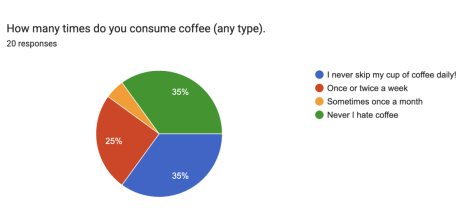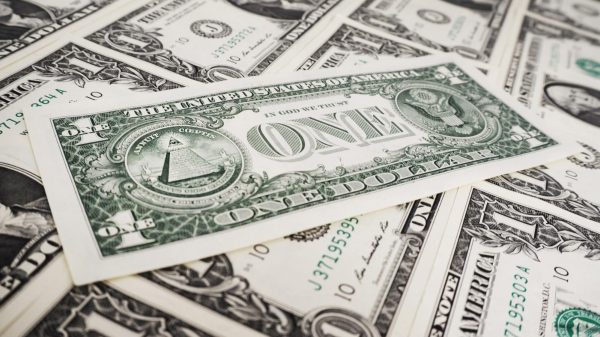The effects of coffee
Coffee is one of the most consumed beverages in the world!
From teenagers to adults, coffee is often chosen as a favorite morning drink. It allows the individual to start the day energized and active for the long journey ahead. Sometimes, good coffee is all you need to relieve the stress of challenging tasks. Coffee can have a positive impact on your mental and physical health, however, irresponsible consumption could lead to detrimental consequences for young adults.
Benefits of Coffee Consumption
Studies have shown that the consumption of coffee might increase someone’s life span if one cup is consumed every day. According to an article from Harvard News, “The study analyzed data from about half a million Britons and found that the more coffee people drank, the lower their risk of dying during the 10-year study period.”

According to the survey, the majority of the NYC iSchool does not like coffee, but the number of everyday consumers almost equals the number of coffee haters. In other words, coffee drinkers tend to get coffee daily while the nondrinkers are the students that do not like the taste of coffee.
Coffee beans are often associated with improving the cardiovascular system. Dr Mungee stated in the article, “Coffee’s health effects on the heart”, that coffee beans can “inhibit the gut’s absorption of fat and block receptors known to be involved with abnormal heart rhythms.”
Additionally, a TED ED titled, “How does caffeine keep us awake?” mentioned that caffeine helps you stay active throughout the day by blocking adenosine, one of the body’s main sleep-inducing molecules. After the body breaks down ATP in exchange for energy, adenosine is released in the process. This molecule attaches to a specific neuron receptor that activates various biochemical reactions that cause neurons extra work to do their process, which makes us sleepy. Caffeine, however, blocks adenosine from attaching to neuron receptors, leading us to not feel sleepy.
Some athletes perform even better when their adenosine receptors are blocked by caffeine. According to Dr. Neil Clarke, caffeine “allows the body to create greater force during its muscle contraction, and contract those muscles more forcefully, as well as more frequently.” Therefore, athletes experience an energy boost that creates better muscle performance.
The Right Amount of Coffee
Everyday consumers must be aware of how much caffeine they are adding to their daily cups. According to a CNN health report, “Adolescents between the ages of 12 and 18 should limit their intake to less than 100 milligrams per day.”
Studies recommend that consumers get small-size coffee at a common coffee house since the average amount of caffeine varies from 80 mgs to 100 mgs. For instance, a small-size iced coffee at Starbucks has 80 mgs of caffeine in the beverage.
As coffee gets “darker” the caffeine will be stronger too, so save those dark coffees for a small tea-size cup, and get a small coffee with two percent of milk instead!
With the right amount of caffeine, consumers could benefit if they drink it daily rather than occasionally. Some studies suggest by Mayo Clinic that “ occasional coffee drinkers may see an increase in their blood pressure after a cup of coffee.” A specialist at Mayo Clinic, Shawn Bishop, asserts that “if you are going to drink coffee, it’s probably best to enjoy it daily to avoid blood pressure spikes.”
Mia Samofalova, a student at NYC iSchool, expresses that she consumes coffee because it helps her be “energized throughout the day” and allows her to do all her “school work without falling asleep.” She enjoys it daily because she feels tired when going for a few days without coffee. This relates to the phenomenon where caffeine creates more adenosine receptors and not consuming it could lead to feeling drowsy.
Addiction and Immoderation
When coffee becomes a necessity rather than a desire, that’s when caffeine becomes a problem. Some students might drink more than two cups of coffee a day to finish an assignment or stay up for longer periods. At first, this habit appears to be advantageous for you, but coffee soon has a negative effect: it makes you need it when performing an activity that requires energy.
One negative effect is that constant amounts of caffeine every day could make a person develop anxiety. According to some genetic investigations, adenosine receptor genes have been linked to the emergence of anxiety. Therefore, when caffeine blocks the adenosine receptors, then adenosine cannot regulate the anxious states of an individual. This shows that some people may be more prone to anxiety problems and that caffeine may enhance their risk.
A student of NYC iSchool shares his opinion on caffeine. Kevin Serrano stated his dislike for caffeine for several reasons. First, he feels that the beverage is going to be a “gateway in order to have reliance on caffeine consumption.” Then, he recognizes that overuse of caffeine “creates an addiction, which ruins sleep schedules and your health ends up taking a toll because of that.” Therefore, Kevin’s opinion derives from the possible addiction and immoderation that can negatively affect someone’s health.
With anxiety, comes trouble falling asleep. It is recommended that young adults consume coffee no later than four hours before going to sleep so that caffeine doesn’t disrupt their sleep.
Conclusion
Caffeine could be considered the world’s most-used substance. Its effects vary from positive to negative, depending on the amount that an individual consumes. Like a golden rule, everything in excess can be harmful to you. Thus, regulating the consumption of caffeine will bring many positive effects in your life that could potentially make it more productive and even life-changing.







